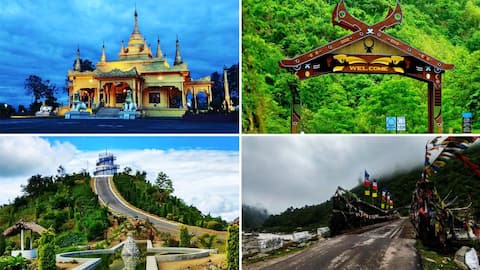Indian states with restricted travel for Indians
What's the story
In India, each state operates independently with its language, culture, and governance. While citizens enjoy constitutional freedom of movement, some states impose travel restrictions.
While tourist spots like Ladakh and Jammu & Kashmir have open access, regions near international borders mandate special permits.
These areas are managed under the Inner Line Permit (ILP) system and prioritize security due to their sensitive nature.
Sensitive border
Arunachal Pradesh
Situated in a strategically sensitive border region adjoining Myanmar, Bhutan, and China, Arunachal Pradesh often requires Indian citizens from other states to obtain Inner Line Permits (ILP) or Protected Area Permits (PAP) to enter certain regions.
The permits, obtained from the resident commissioner's office in major cities, are aimed at regulating the movement of people and protecting indigenous communities and fragile ecosystems.
Cultural preservation
Nagaland
Nagaland, known for its diverse tribal heritage, requires all Indian citizens to obtain Inner Line Permits (ILP) to visit.
This measure, similar to that of Arunachal Pradesh, aims to protect the interests of the indigenous Naga tribes and preserve their unique culture. Permits can be obtained online or from designated authorities.
This supports cultural preservation efforts while allowing responsible tourism in the state.
Regulating access
Mizoram
Situated adjacent to Myanmar and Bangladesh, this state of Mizoram requires Inner Line Permits (ILPs) for visitors, a process facilitated by government liaison officers in Kolkata, Silchar, Shillong, Guwahati, and New Delhi.
Special provisions are made for air travelers to obtain these permits, ensuring controlled access.
This measure regulates access, ensuring the preservation of the state's cultural and security interests.
Outsider influx
Manipur
On December 11, 2019, an order signed by President Ram Nath Kovind extended the ILP system to this state, marking it as the fourth northeastern state after Arunachal Pradesh, Mizoram and Nagaland to adopt such a practice.
The objective is to govern the influx of outsiders and safeguard the indigenous communities along with their cultural traditions and customs.
State security
Sikkim
Accessing remote protected areas in Sikkim such as Tsomgo-Baba Mandir, NathuLa Pass, and trekking routes mandates permits issued by the state's Tourism & Civil Aviation Department.
These permits can be obtained at entry points or through authorized tour operators. Foreign visitors to the state are required to register themselves within 24 hours of their arrival.
This regulation facilitates responsible tourism while ensuring state security.
